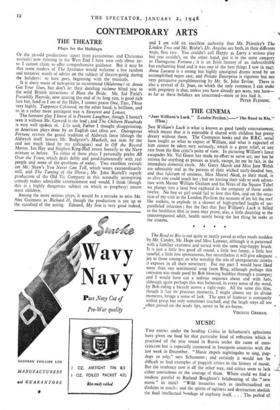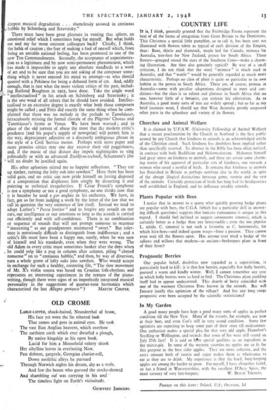MUSIC
Two entries under the heading Critics .in Schumann's aphorisms have given me food for that particular kind of reflection which is practised all the year round in Russia under the name of auto- criticism but is especially connected in bourgeois countries with the last week in December. " Music impels nightingales to sing, pug- dogs to yelp," says Schumann ; and certainly it would not be difficult to find examples, of puggish critics in the history of music. But the tendency now is all the other way, and critics seem to lack either convictions or the courage of them. Where could we find a modern parallel to Rutland Boughton's belabouring of the "new music " in 1922? " Wild insanities such as intellectualised art disdains to touch : and the spirits of ugliness and destruction abolish the final intellectual bondage of euphony itself. . . . The period of
deepest musical degradation . . . shamelessly avowed in cretinous babble by Schonberg and Stravinsky."
There must have been great pleasure in venting that spleen, an emotional relief which I sometimes long for myself. But what holds me and my far more eminent colleagues back? Chiefly, I think, the habit of cauition ; the fear of making a fool of oneself which, from being an amiable national feeling, has been promoted to one of the new Ten Commandments. Secondly, the acceptance of experimenta- tion as a legitimate and by. now semi-permanent phenomenon, which .has made it impossible to apply any absolute standards to a work of art and to be sure that you are not asking of the composer some- thing which it never entered his mind to attempt—as who should quarrel with a Pekinese for being a debased form of cat. And, oddly enough, that is just what the more violent critics of the past, includ- ing Rutland Boughton in 1922, have done. Take the single word " intellectualised " in his attack on Schonberg and Stravinsky ; it is the one word of all others that he should have avoided. Intellec- tualised to an excessive degree is exactly what both those composers might be called ; and Fens did exactly the same thing when he com- plained that there was no melody in the prelude to Tannhiiuser, miraculously missing the formal chorale of the Pilgrims' Chorus and Tannhauser's hymn to Venus. We have been warned ; and in place of the old torrent of abuse the most that the modern critic's prudence (and his paper's supply of newsprint) will permit him is the wry, depreciatory adjective or a discreetly ambiguous phrase in the style of a Civil Service memo. Perhaps with more paper and more proteins critics may one day recover their old puggishness, and, if the music of that distant day impels nightingales to sing polmodally or with an advanced Zwiilfton-technik, Schumann's jibe will no doubt be justified again.
His other aphoriim stirred me to happier reflections. "They cut up timl?er, turning the lofty oak into sawdust." Here there has been solid gain, and no critic can now pride himself on having disposed of a composition that displeases him simply by dissecting it and pointing to technical irregularities. If Cesar Franck's symphony is not a symphony or not a good symphony, no one thinks now that it is becallse he used a for anglais in his .orchestra. We have; in fact, got so far from judging a work by the letter of the law that we call in question the very existence of law itself. Instead we tend to adopt Luther's " Pecca fortiter " and to forgive any assault on our ears, our intelligence or our emotions so long as the assault is carried out efficiently and with self-confidence. There is no combination or sequence of sounds that will not prompt someone to murmur " interesting " as our grandparents murmured " sweet." But toler- ance is notoriously difficult to distinguish from indifference ; and a critic's life must have been a happy one, surely, when he was sure of himself and his standards, even when they were wrong. The old Adam in every critic must sometimes hanker after the days when he could yelp like a pug in column after column, piling "clotted nonsense " bn to " cretinous babble," and then, by way of diversion, turn a whole grove of lofty oaks into sawdust. Who would accept in exchange for such a healthy, roistering life, " The slow movement of Mr. X's violin sonata was based on Croatian folk-rhythms and represents an interesting experiment in the texture of the piano-. writing, though there were signs of an imperfectly integrated musical personality in the suggestions of quarter-tone harmonics which characterised the last Allegro grotesco" ? MARTIN COOPER.







































 Previous page
Previous page